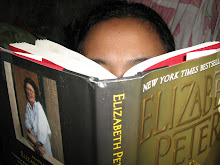I had the privilege of attending the 2nd Asian Regional Conference on Women's Studies of the Women's Studies Association of the Philippines at Miriam College last Monday to Wednesday, March 24-26, 2008, together with Ms. Rio (Brigino), Ms. Tin (Mandigma), Audrey, and others from WikiPilipinas and Filnet. The theme: 21st Century Engagements: the Politics and Praxis of Women's Studies in Asia". Discussions during the first day dealt with women's studies and education, the second day dealt with women's rights, and the third day dealt with globalization.
We had a booth at the conference, aside from being participants, and during the first day, we also got to make a presentation about Wikipilipinas' "Encyclopedia of Philippine Women" and Filipiniana.net's "Philippine Women's Studies Microsite" to the conference attendees. Whew.
There were a lot of interesting topics discussed and papers presented at the conference. During the second day, Atty. Adoracion C. Avisado from Davao spoke most emotionally about the state of women's rights and the Philippine justice system, and presented several case studies. Madam Nurshahbani Katjasungkana from Indonesia also spoke on what it's like to be a woman in a fundamentalist Moslem country, where doing anything outside of rigidly prescribed norms gets you labeled "un-Islamic". Later on, Dr. Sylvia Estrada-Claudio also touched on fundamentalism in connection with women's rights. She postulated that the patriarchal system seeks to control women because we are considered the "markers" of the group; that is, we define what a particular group is that we belong to. (My reaction to that: hey, you guys, if you don't know what or who you really are, why force us to tell you?) In short, women are made to conform to many rigid strictures and suborn their own individual identities in order to be definitive of the group they're in. That's why when a country or a people invades another, the women of the invaded country get raped: it becomes a violation of the entire country or people since women symbolize the group. Meanwhile, men seek to advance their own personal benefit under the guise of certain "noble ideals" like patriotism and religious fervor (I knew that already!). Madam Hiroko Hara of Japan's Josai International University commented, "Money matters." As, indeed, said Dr. Claudio, the "good old boy" system makes certain of it!
Wow, I didn't know I got so much from that discussion. What I've said or described so far is only a small part of everything that was discussed at the conference. Anyway, on the third day, Ms. Tin was a speaker during the Round Table Discussion on Media, the ICTs and Cyberworld, along with Ms. Dine Racoma and Ms. Noemi Lardizabal-Dado.
During the conference, someone said that the Philippines now ranks Number 6 in terms of gender relations and that the other five are all Scandinavian countries, while the USA ranks far down the line. Listening to the discussions, I could argue for and against that finding. Looking at it from one angle, we are fortunate in that we have advanced legislations that protect women's rights, and that Philippine women have more rights than other women in other countries. However, from another angle, reality bites-- many times these legislations have been circumvented or disregarded altogether, and no one has done anything concrete about that. Also the women who know and freely enjoy the exercise of their rights are those educated ones from the middle and upper class, meaning that the huge majority of women in the country are still repressed in many ways. Thankfully, there are things like the WSAP Conference and there are women who fight for the rights of those who can't do it for themselves.
No woman is required to build the world by destroying herself. ~Rabbi Sofer
If all men are born free, how is it that all women are born slaves? ~Mary Astell
(also posted on Filipiniana.net Blogsphere.)











